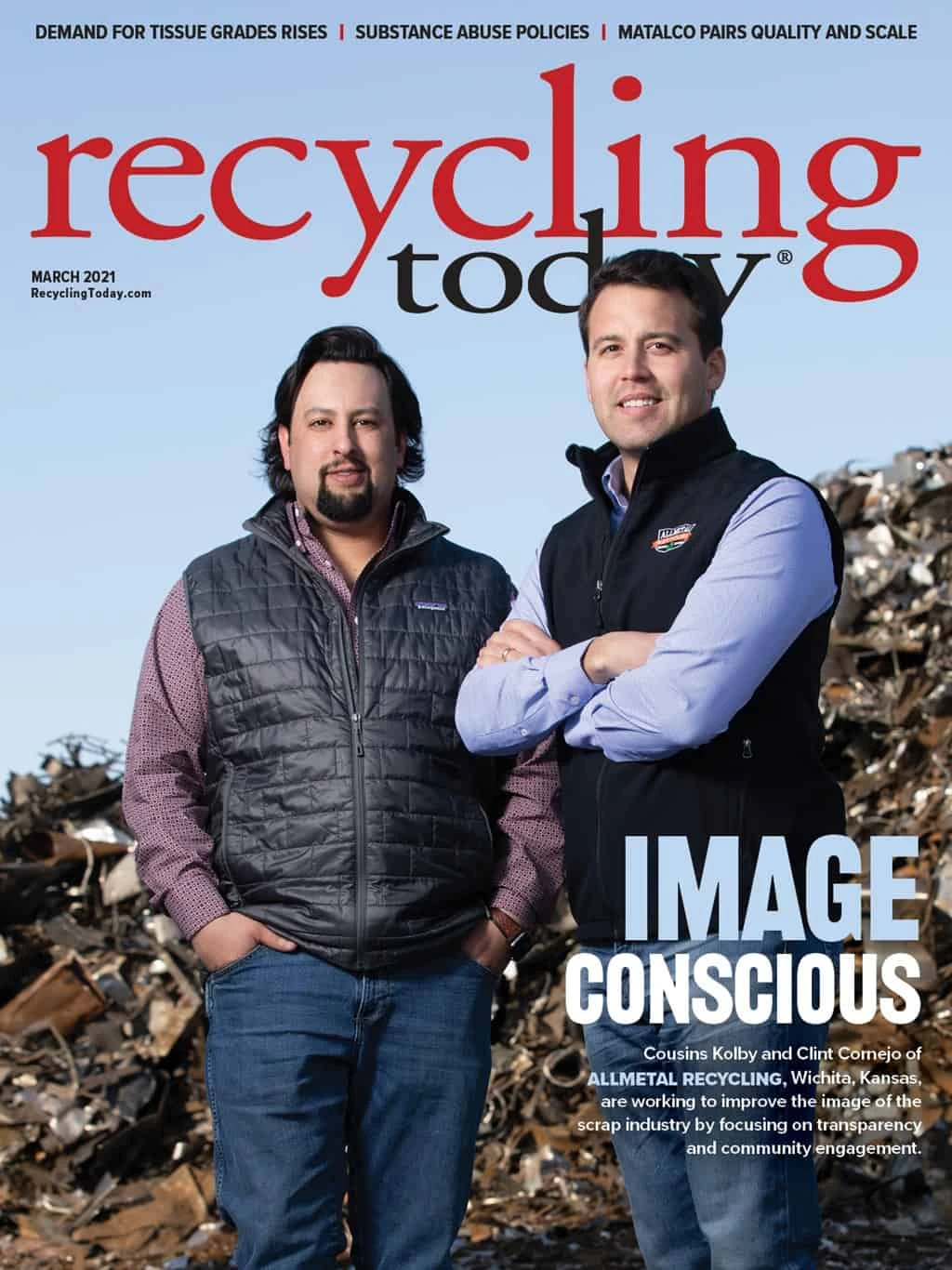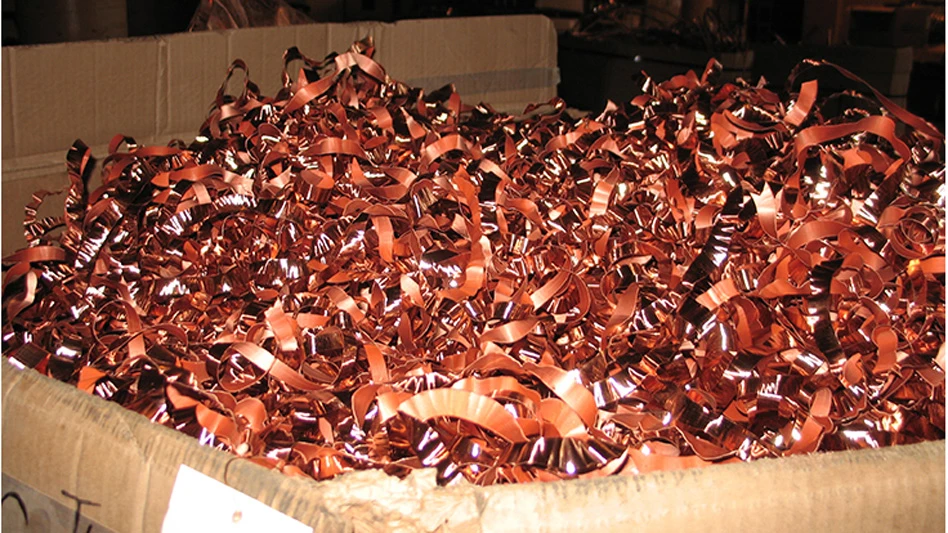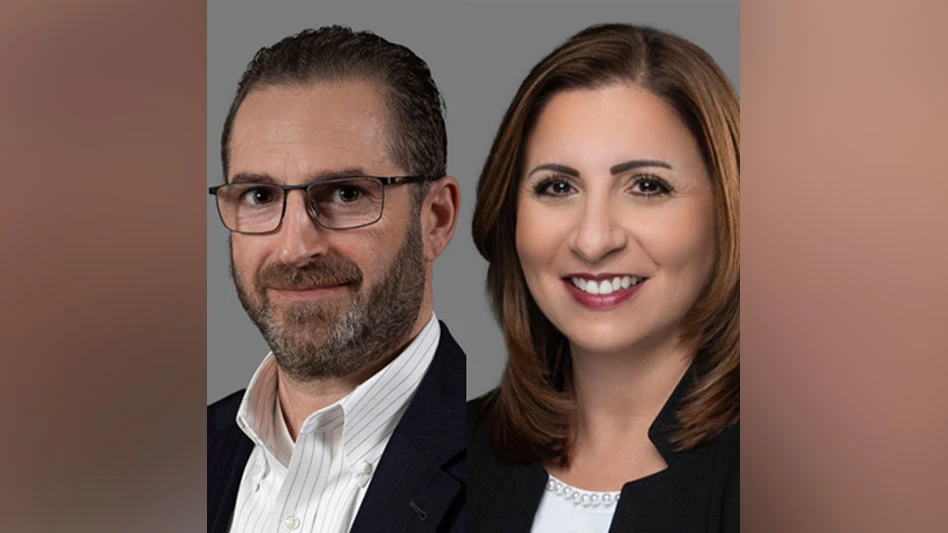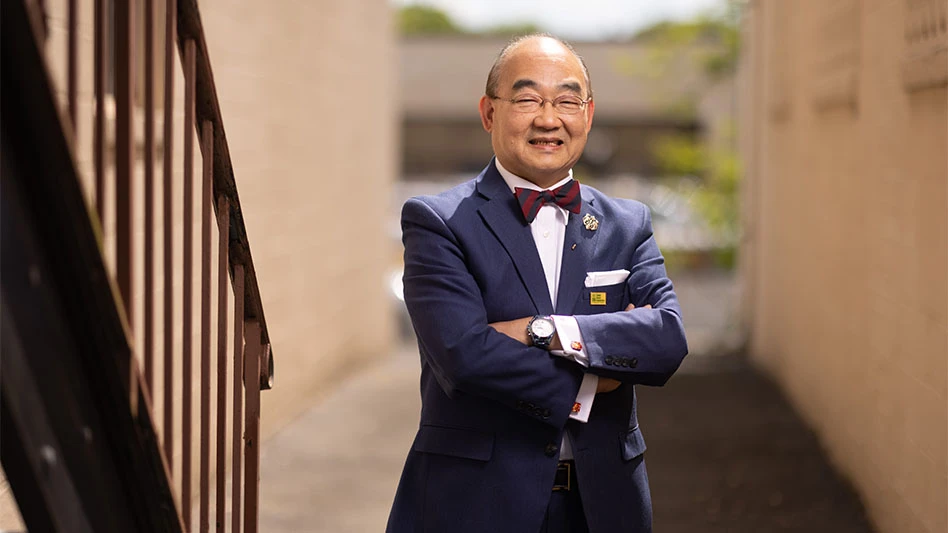
Photo courtesy of Maite Quinn-Richards
A variety of close relationships have helped to shape Closed Loop Partners’ Maite Quinn-Richards’ career in the recycling industry. Quinn-Richards says she majored in journalism while pursuing her undergraduate degree at New Jersey-based Rutgers University in the early 1990s. After starting a career in journalism and television, she had a few conversations about the recycling industry with her friend’s father, Joseph Donnolo, who owned New York-based Sprint Recycling. He invited her to join the business in 2001.
“He asked me if I would join the company, which would pay for my MBA,” she says. “So, I took that leap of faith and never looked back after that because there was so much opportunity in [the recycling] space for me. I felt like finally I could have a really big positive impact.”

Quinn-Richards helped Sprint Recycling manage marketing and sales before she transitioned to the role of president as the business grew into the largest privately held recycling company in the U.S.
In 2009, after the market crashed, she says Donnolo decided to close Sprint Recycling. Having forged a great relationship with New York-based Sims Municipal Recycling while at Sprint, Quinn-Richards then took a position with Sims as director of marketing and business development.
Around that time in her career, Quinn-Richards says more private equity companies started calling her about investing in the recycling industry.
“The calls just kept coming in, and I thought to myself, ‘Wow, look at all this money now coming into our space with a lot of people that don’t know the recycling business,’” she says. “I thought this could be an opportunity for me to make a change—to make another impact in the sense that I could go work for a private equity firm that needs my operational expertise. I started speaking to private equity companies just trying to understand and explore the space.”
Quinn-Richards says she knew Ron Gonen, CEO of Closed Loop Partners, from the time she started working at Sprint Recycling. They occasionally met for lunch to talk about business. In 2018, Gonen, who also co-founded and served as CEO of RecycleBank from 2003 to 2010, asked Quinn-Richards whether she would be interested in joining him at Closed Loop Partners to help him as he started the company’s private equity arm, the Closed Loop Leadership Fund, that year. “That was like a no-brainer decision in the sense that I knew Ron and his organization,” she says. “It was a really good match.”
Quinn-Richards has been a managing director with Closed Loop Partners for almost three years. “I came in knowing that I was going to be the operational expertise. I’m co-leading the fund with my colleague Martin Aares, and he has many years of experience on the fund and financial side. So, we’re an amazing team. I also have Michael Gajewski, who’s our [Chief Financial Officer], helping us on the Leadership Fund side.
“As far as my role goes, I help on the pipeline side because I have long-term relationships in the industry. I know the good players from the bad players, and I know who is best in class [and] who we want to work with.”
Quinn-Richards explains the pivotal role relationships can play in the circular economy in the following interview:
Recycling Today (RT): You helped Closed Loop Partners acquire a stake in Austin, Texas-based Balcones Resources. How did Closed Loop Partners build a relationship with that company, and what has it been like working through that transaction?
Maite Quinn-Richards (MQR): My colleague Michael Gajewski, formerly CFO of Canusa Hershman, had known and worked with Kerry Getter, CEO of Balcones, for more than 15 years. Kerry and Michael began speaking about this partnership and the transaction for over a year. Kerry was keen on the idea of collaborating with Closed Loop Partners, and together we worked through the diligence process and made it happen.
After we closed in October of 2019, I began spending quite a bit of time out in Austin to really get to know the broader team and help think through their strategies for the coming years. It was also a way for all of us to get to know each other better and bring both of our companies closer together. As we at Closed Loop Partners continued to speak with [material recovery facilities, or MRFs] across the country conducting studies, my colleague at Closed Loop Partners Jon Powell introduced me to Single Stream Recyclers (SSR). After a few visits with the team at SSR, we thought maybe there was an opportunity for Balcones. Balcones was excited about the opportunity to acquire SSR—they were a match made in heaven.
RT: How did COVID-19 affect Closed Loop Partners and its projects in the past year?
MQR: We’ve actually seen the pandemic accelerate sustainable action and investment, with the pandemic shedding light on the risks of opaque global supply chains and the inadequacies of the status quo. The pandemic has demonstrated a need for more circular and resilient supply chains, and large corporations are doubling down on their sustainability commitments and efforts as a result.
For example, last year we launched the $15 million Beyond the Bag Initiative with CVS Health, Target and Walmart. Both Microsoft and Nestlé invested $30 million in Closed Loop Partners’ funds as well, signaling rising commitments from leading corporations to achieve supply chain efficiency and climate goals through circular solutions.
Closed Loop Partners also played an active role in responding to the effects of COVID-19 by supporting local communities and organizations as well as the firm’s portfolio of companies through a number of initiatives. … Across Closed Loop Partners’ Infrastructure Fund portfolio, none of the recycling facilities shut down or closed during the pandemic, demonstrating the resilience and essential nature of these businesses. Recovered materials played a critical role in maintaining and supporting key supply chains that in part helped address many challenges brought on by COVID, such as recycled paper supply needed for the increase in e- commerce packaging and toilet paper.
“I help on the pipeline side because I have long-term relationships in the industry. I know the good players from the bad players, and I know who is best in class [and] who we want to work with.” – Maite Quinn-Richards, managing director, Closed Loop Partners
For Closed Loop Infrastructure Fund portfolio companies, Closed Loop Partners convened multiple virtual meetings to better understand their challenges and connect with each other to share best practices while also helping support procuring critical supplies for the facilities to keep operating. Closed Loop Infrastructure Fund also restructured six loans, building in flexibility during a challenging period for businesses during the pandemic.
RT: Did it surprise you that there was that level of interest in sustainability and recycling during a pandemic?
MQR: You know, it did surprise me. I was ready for people backtracking on the postconsumer content. I was fearful; but. no, I’ve just seen it keep moving forward. And that makes me believe that brands are in it for the long haul. This was their test, and they are still plowing ahead.
RT: Down the road, how do you think the pandemic will affect municipal recycling?
MQR: I don’t think any of us know yet how that’s really impacted the municipalities as of today until we see the impact of people not paying taxes and what that’s going to do to recycling infrastructure. … I’ve been in touch with all of the cities we work with through Balcones and SSR, and I’ve asked them that question, and they all said, “No, there’s no talk of taking away these recycling programs.” But I think we’ve chosen to work with—and SSR and Balcones have chosen to work with—really forward-thinking cities that are not backing down, and they have communities that are really focused on this. In the next year or two, we’re going to see if people really don’t have the dedication to stick with sustainability. If the funding’s not there, we’ll see what happens. But I think Sarasota, [Florida], and Austin, and those areas, I think they’re really strong and committed.
RT: What would you say are the biggest challenges with the recycling supply chain today and why?
MQR: Increasingly evolving and growing waste streams with new packaging formats and types is one. Another is the current misalignment between the materials introduced to the market and the recovery infrastructure available to process these materials after use. Also, the need for greater investment in modernizing and updating recovery infrastructure across the U.S. in order to increase efficiency and capture the value of materials after use.
Closed Loop Partners works across the recycling value chain, financing recycling and circular economy infrastructure to improve the capture of existing materials after use while also advancing material innovations and reuse and refill models to stem production of unnecessary packaging where possible. The firm is a unique hybrid business model with an innovation center for research, analysis and collaboration alongside multiple investment funds, spanning venture capital, growth equity, private equity and project-based finance.
Closed Loop Partners provides an arc of capital that accelerates the growth of early-stage companies through to established companies. Each vertical of the firm builds upon one another, bridging gaps and fostering synergies to scale the circular economy.
Because collective work is needed to build circular supply chains, Closed Loop Partners connects critical stakeholders through its network—entrepreneurs, industry experts, global consumer goods companies, retailers, financial institutions and municipalities—to ensure that no challenge is solved in isolation.
RT: What legislation do you think might help the recycling industry and why?
MQR: Extended producer responsibility sees producers manage the end of life of their products and can play an important role in encouraging the development of a more circular economy among other important levers to accelerate the shift toward circularity. EPR can increase transparency, create better accounting for the external costs of recovering materials after use and encourage producers to harness design innovation. EPR is one tool that can be deployed among others to galvanize the momentum behind the [circular economy]. Even with EPR, we still need to build a market for recycling and drive innovation.
RT: What brand owners are heavily investing in recycling?
MQR: Our first fund—Closed Loop Infrastructure Fund, which was founded in 2014—brings together many of the world’s largest retailers and consumer goods companies, including Amazon, Starbucks, Unilever and Colgate-Palmolive, among others, to pool capital and invest via our fund into recycling and circular economy infrastructure in the United States. Just last year, even amid COVID, the original nine investors in the fund—3M, Coca-Cola, Colgate-Palmolive, Johnson & Johnson Consumer Health, Keurig Dr Pepper, PepsiCo, Procter & Gamble, Unilever and The Walmart Foundation—decided to extend their capital commitments, strengthening their investment in the infrastructure needed to build a more circular economy.
All of these companies share the same problem—losing sight of their products and packaging beyond the point of sale with too much ending up in the landfill or our oceans. One company alone cannot tackle the systemic issue.
Many of these companies have large public commitments to use recycled content in their packaging, but they cannot meet them unless the supply side catches up with demand for [recycled polyethylene terephthalate].
RT: Are brand owners doing enough to support recycling?
MQR: Not all brands are created equal—some are leaders, and some are laggards. We’d argue that those who have invested through our funds or our center are taking a leadership position. Overall, brands continue to make ambitious commitments to use recycled materials in their products and packaging, which creates the critical pull through the system.
That said, we now need to see more of these commitments translate into off-take agreements and long-term purchase orders or multiyear contracts to buy recyclables in a way that creates partnerships across the supply chain with shared risk and reward, not just transactions. This will help to build enduring markets, enabling investment in the system to deliver higher quality outputs.
RT: How can you tell if a company is a leader or a laggard as you put it?
MQR: I’ve been working really closely with the brands from the Closed Loop Partners perspective, and seeing how many high-level people are getting involved in these conversations shows to me it’s serious. Like when you have 20 people from Nestlé on a call about how to help increase recycling that are at the executive level, to me that’s serious. They’re putting their money where their mouth is; they’re putting their time behind that. So, I believe that they’re really pushing to get this done. I said earlier [that] COVID came [and] it could have been an easy way for them to say, “Oh, it’s a pandemic. We can’t do all of the things we said we were going to do.” It would have been a perfect out for them. And the fact that they just continued to pursue and that we got Nestlé funding during the pandemic says a lot.
RT: What other trends in the recycling industry are interesting to you right now?
MQR: There is a clear pathway to scale for reusable packaging models, and it’s no longer a question of if but when they are implemented. They are an important part of the suite of solutions deployed by individuals, brands and cities to address urgent global waste challenges. We are also seeing brands move from plastic to paper and aluminum. This is exciting, but brands need to make sure they work with MRFs and processors to confirm that the formats are recyclable for value and use recycled content in those materials as well.

Explore the March 2021 Issue
Check out more from this issue and find your next story to read.
Latest from Recycling Today
- Nexwaste acquires 3 Texas businesses
- Maryland EPR bill awaits signature
- ABTC sells Fernley, Nevada, property
- Aqua Metals developing LFP recycling process
- RMR ceases shredding operations in Newport, Kentucky
- Bluewater streamlines solar panel replacement, recycling in Bermuda
- Steve Levetan to receive ReMA Lifetime Achievement Award
- ReMA, Germany’s VDM issue joint tariff statement





